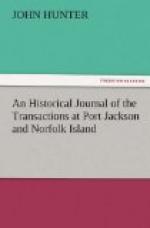Both this and the last branch we examined, probably extend many miles farther than we with our boats could trace them, but they did not appear, where we left off the examination of them, to be navigable for any vessel but the canoes of the natives, which do not draw more than two or three inches water. We saw several natives in these branches, but they fled into the woods on our approach: the wretched condition of the miserable natives who have taken up their residence, for a time, so far back from the sea coast, where no fish are to be had, is far beyond my description; they, no doubt, have methods of snaring or killing the different kinds of animals which are to be found here, otherwise I think it impossible they could exist at any distance from the sea: for the land, as far as we yet know, affords very little sustenance for the human race.
Having advanced as far as possible with the boats, we returned, and having rowed two or three miles down to a point where there was tolerable landing, we put a-shore, and pitched the tents for the night. In the morning of the 4th, while the tents were putting into the boats, I measured the height of the opposite shore, which I found to be 250 feet perpendicular above the level of the river, which was here 30 fathoms wide: at seven o’clock we embarked, and rowed down until we came to the entrance of the second southern branch, where we found good depth of water, in six and seven fathoms. This, from its depth, encouraged us to hope that it might extend a great distance to the westward: we went up this branch about 13 or 14 miles before we put on shore for the night: in this distance, the general depth of water was from two to seven fathoms, and the breadth of the river from 70 to 140 fathoms; but the country still wore a very unpromising aspect, being either high rocky shores, or low marshy points.
After having rested for the night, we were again under way at day-light, and this day advanced about fourteen miles against the tide. In the woods we frequently saw fires, and sometimes heard the natives; in the afternoon we saw a considerable number of people in the wood, with many fires in different places; we called to them in their own manner, by frequently repeating the word Co-wee, which signifies, come here; at last, two men came to the water-side with much apparent familiarity and confidence: I thought, from this circumstance, that they had certainly seen us before, either at Botany-Bay, Port Jackson, or Broken-Bay; they received a hatchet, and a wild duck, which had been just before shot from the boat; and in return, they threw us a small coil of line, made of the hair of some animal, and also offered a spear, which was refused. The only argument against their having seen us before is, that they were the first we had met with who appeared desirous of making a return for any present they received.
Here the banks of the river are low and covered with what we call the pine-trees of this country; which indeed have received that name merely from the leaf, which is a good deal like the pine, but the wood is very different.




